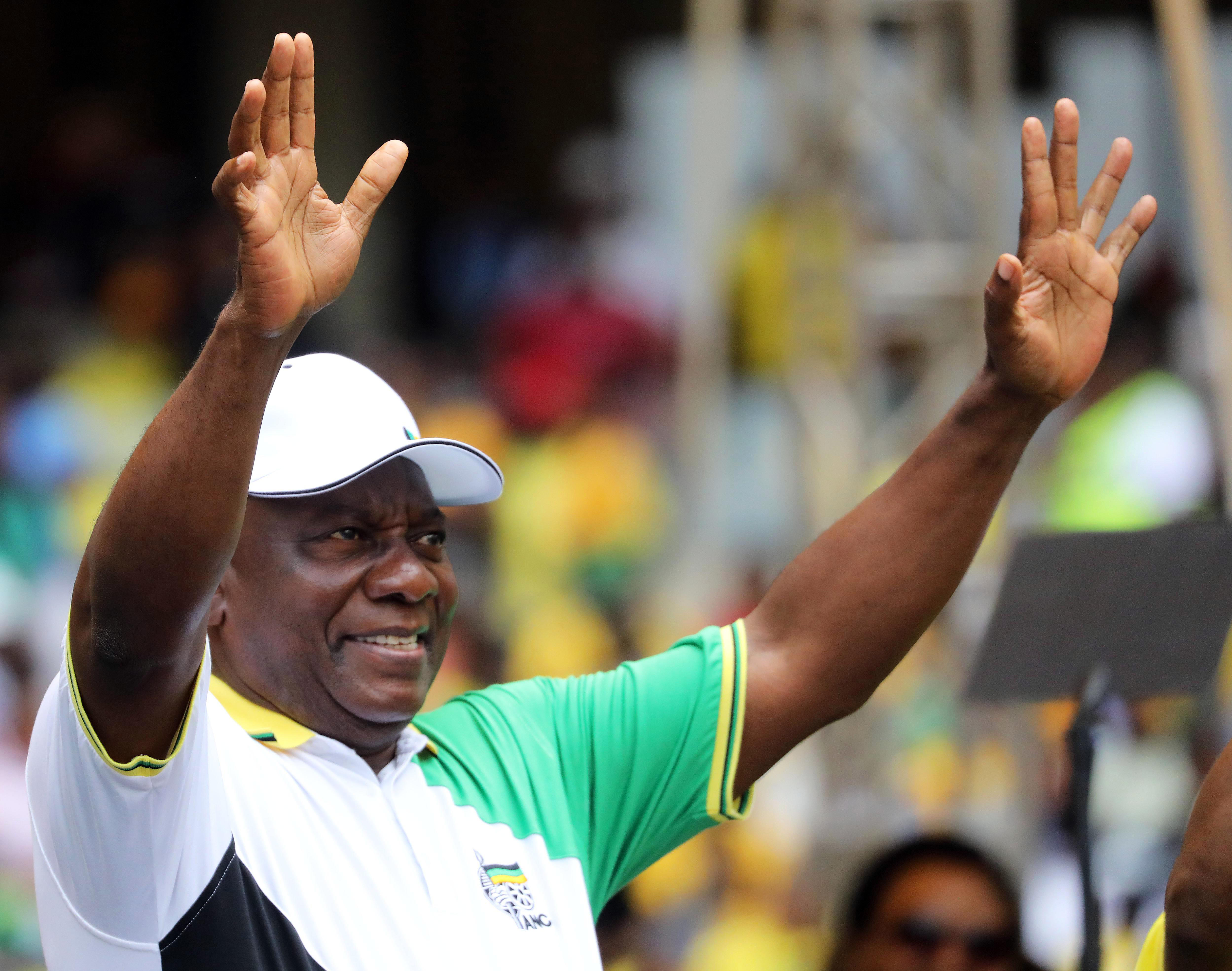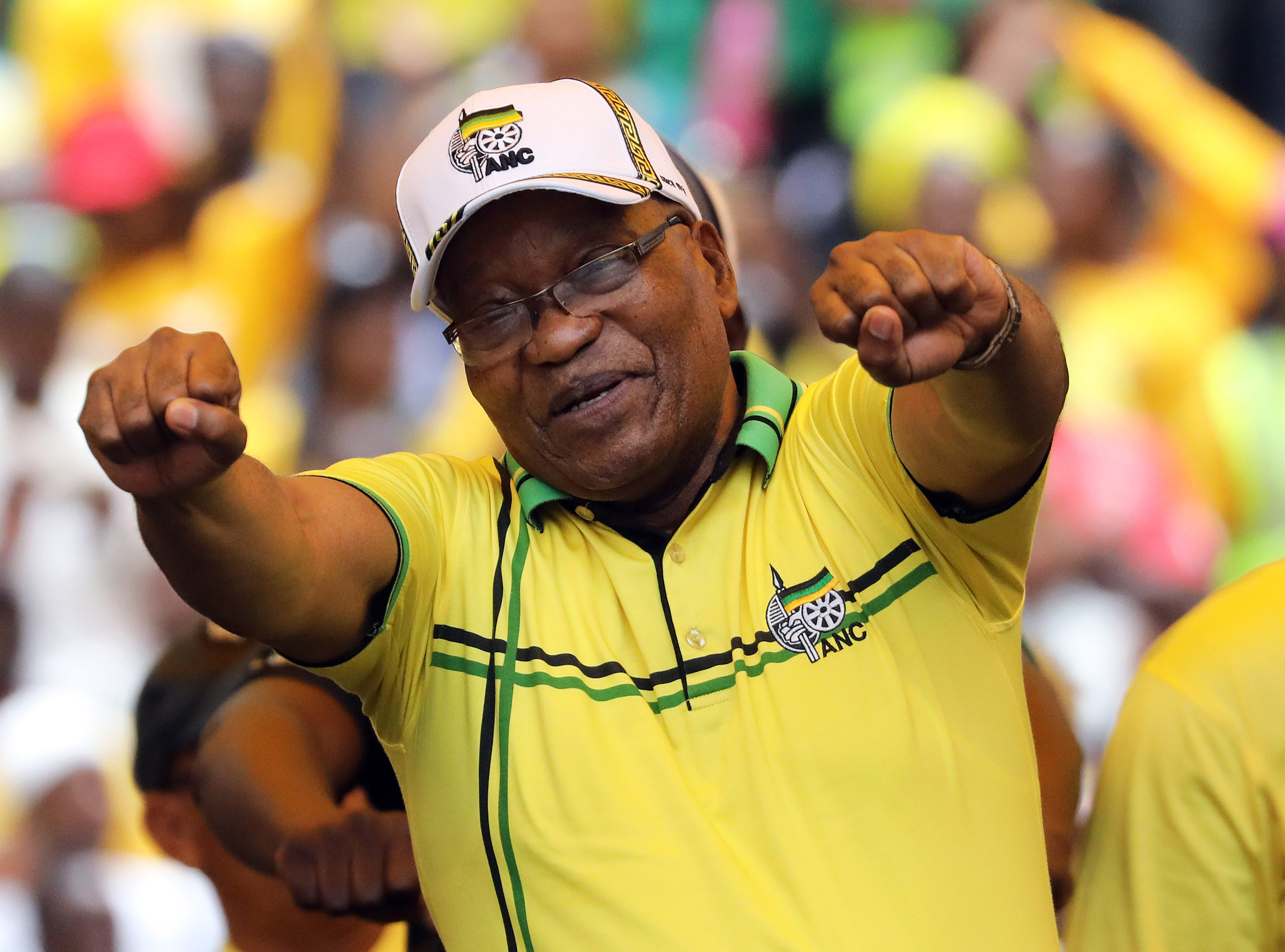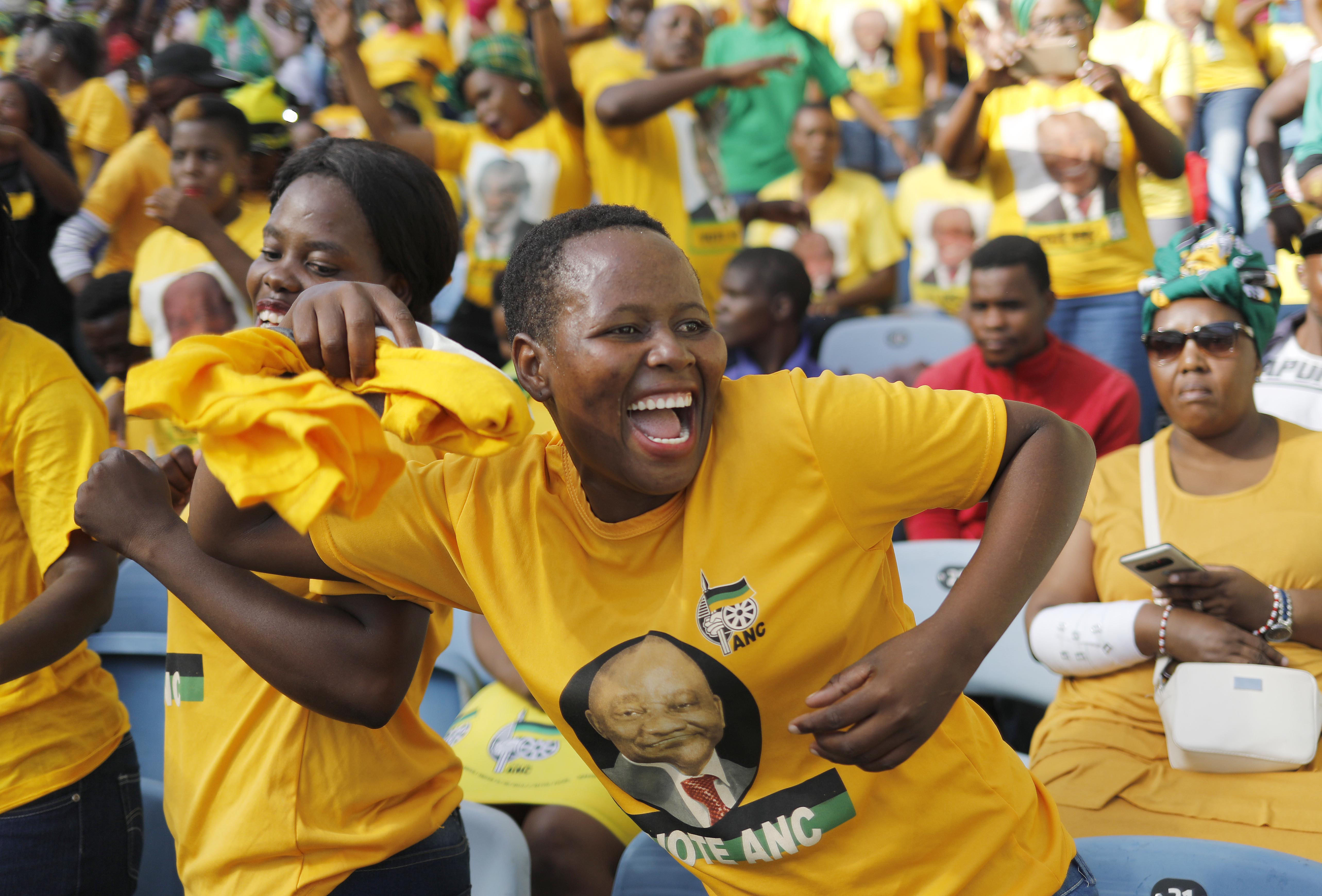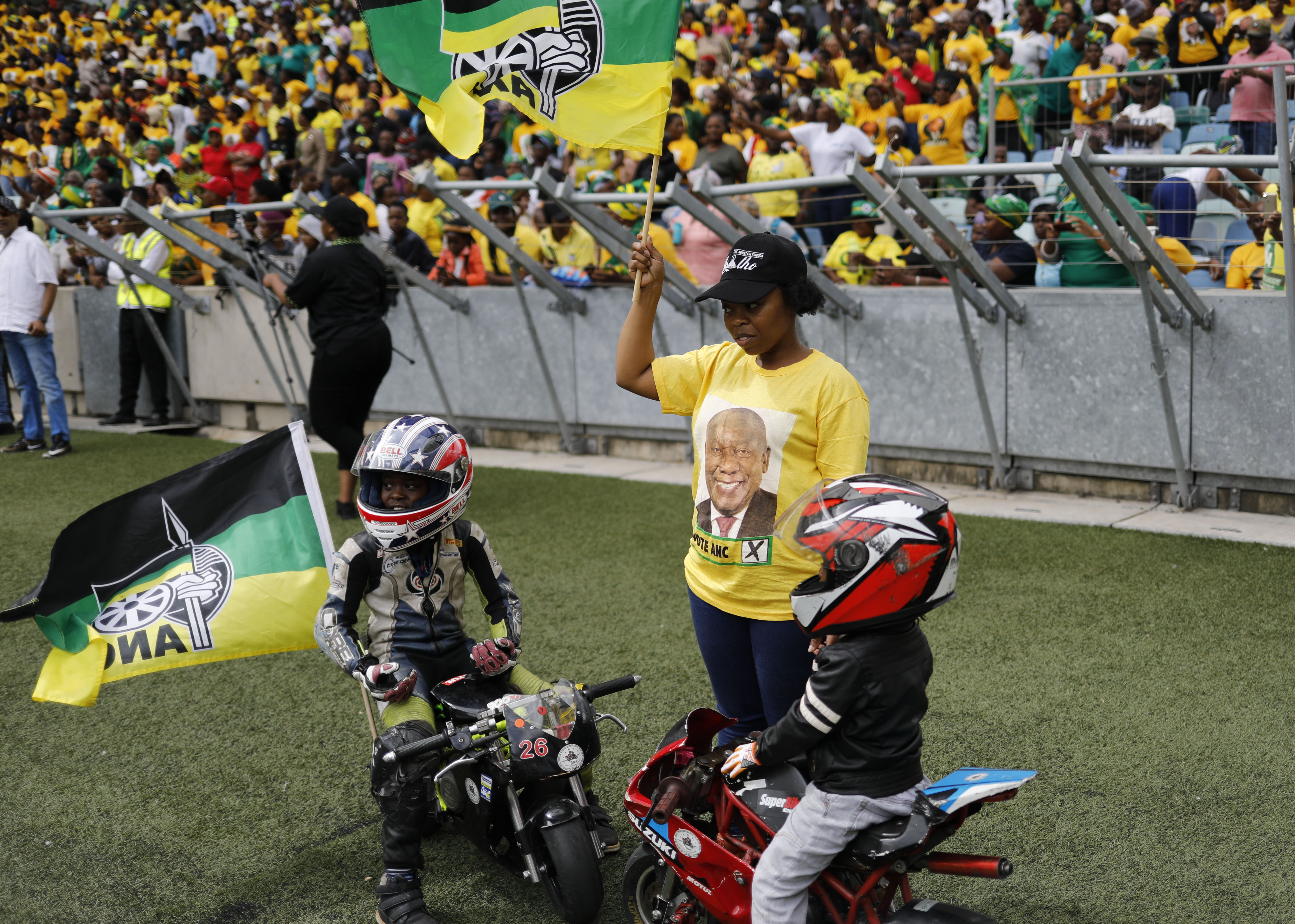People started arriving at eThekwini’s Moses Mabhida Stadium early, well before the gates’ official opening 7am. Strong winds played havoc with banners – including the “Let’s grow South Africa together” banner youngsters wanted to unfold in the stadium’s centre – and the large television screens suspended on the sides of the main stage. Those winds, but apparently also the slow processing at security checkpoints, led to an about two-hour delay.
By the time the programme started at 11am, thousands of people still streamed into the packed stadium for standing room on the pitch. A week of mobilisation – as the ANC calls knocking on doors, addressing meetings and handing out pamphlets – seemed to have paid off.

ANC (African National Congress) and South African President Cyril Ramaphosa during the ANC Election manifesto launch, Durban, South Africa, 12 January 2019. EPA-EFE/KIM LUDBROOK
When ANC President Cyril Ramaphosa started to speak, he stuck to the themes of the week – unity and renewal. And how the ANC has “self-corrected” after listening to complaints about corruption, factionalism, patronage and State Capture, and was rebuilding itself to reclaim integrity and credibility as a party and in government.
“We must acknowledge that State Capture and corruption have weakened several of our public institutions, undermined effective governance and contributed to the poor performance of our economy. We must also acknowledge that factionalism and patronage have diminished the ability of the ANC to lead the process of transformation and fulfil its mandate to the people,” Ramaphosa said.

Former South African President Jacob Zuma dances during the ANC Election manifesto launch, Durban, South Africa, 12 January 2019. EPA-EFE/KIM LUDBROOK
“As the ANC, we admit our shortcomings. We accept the criticism of the people and we are hard at work to correct our mistakes. The last 25 years have demonstrated the enormity and complexity of the task of redressing the injustices of the past and advancing fundamental change.”
The 2019 elections were a “crucial moment” of hope and renewal for South Africa, added Ramaphosa: “The 2019 elections provide an opportunity to restore our democratic institutions and to return our country to a path of transformation, growth and development”.
And that also required a capable state and committed public servants. “We cannot and will not allow situations where government fails South Africans,” said Ramaphosa. “We call on all our people to join us in this endeavour to build a capable and ethical state and to ensure that those who are responsible for stealing both public funds and private investments face the full might of the law.”
Much of the manifesto undertakings build on what’s already in the making in the ANC government, according to the manifesto.
Under “sustainable land reform”, land expropriation without compensation is billed as one measure where appropriate. The legislative steps for an expropriation law and steps to amend the Constitution to expressly permit compensationless expropriation are already in progress. The public comment deadline on the Expropriation Bill is in a few weeks; the parliamentary committee to draft the constitutional amendment for land expropriation is anticipated to be established early in the parliamentary year that kicks off with the State of the Nation Address (SONA) on 7 February.
And while the National Health Insurance (NHI), to correct “the injustice” of inequitable health care for the poor, was cited as a key undertaking to redress inequality, it was noted the enabling legislation was still needed. The inclusion of the NHI, which has yet to be full costed by the National Treasury, is a key nod to the ANC’s alliance partners, trade union federation Cosatu and the South African Communist Party (SACP).
On “capable, honest government”, the manifesto promises lifestyle audits of public officials and preventing public servants from doing business with the state. Both these matters are in progress – for example, the SAPS national commissioner Lieutenant-General Khehla Sitole in late 2018 told MPS such lifestyle audits are underway – while the public service and administration regulations regarding a ban on civil servants from doing business with the state have been in place for some two years, but by all accounts not enforced. Now that will change and the law and regulations would be implemented.

African National Congress (ANC) supporters attend the ANC election manifesto launch in Durban, South Africa, 12 January 2019. EPA-EFE/KIM LUDBROOK
And the manifesto undertaking to make tender systems more transparent is also not exactly new, as the central suppliers’ database where all government suppliers must register has been up and running for over a year. And also in place for at least two years is government’s decision to lever 30% of its procurement budget towards small and medium enterprises and companies.
The manifesto pledge is clear: “We will put an end to State Capture, restore the integrity of public institutions and tackle corruption while ensuring that government has the capacity, resources and people to serve citizens effectively”.
The other key take away from Saturday’s ANC manifesto launch is the focus on the economy.
On “decent jobs”, key measures are in place, be it the national minimum wage or the resolutions from the 2018 jobs summit Ramaphosa initiated since becoming South Africa’s president in February 2018, alongside the investment conference also held late in 2018. And so the manifesto can say 275,000 jobs would be created by encouraging local production, and with the help of R1,2-trillion investment. The message is firmly rooted in the co-operation of social partners, including government, business and labour.
Other key points like financial sector transformation have also gone some way, largely on the back of an initiative driven by Parliament’s Standing Committee on Finance that held financial sector public hearings a year ago. Its not insubstantial report outlines a clear way forward to financial sector reform. The cost of doing business is set to be reduced.
The manifesto clearly situates these measures within radical socio-economic transformation, the hallmark of the grouping that opposed Ramaphosa for ANC president at the December 2017 Nasrec national conference. It’s a nod to that faction in the spirit of building unity: “Out struggle for radical socio-economic transformation continues. Our economy has not been fundamentally transformed…”
It’s part of the unity drive that has characterised this week’s ANC activities across KwaZulu-Natal, where Ramaphosa shared Tuesday’s ANC 107 birthday celebrations in Inanda with former president Jacob Zuma. Heavily pregnant with symbolism –channelling Madiba on the day he cast his vote in the first democratic elections – wreaths were laid by Ramaphosa and Zuma at the graveside of ANC founding president John Langalibalele Dube. The message? ANC unity and renewal, a return to traditional values including integrity, while moving forward towards the 2019 elections.
Or as Ramaphosa told the guests at Friday night’s gala dinner, despite errors of the past few difficult years, it was important not to forget about achievements that have already improved people’s lives. While criticism that obsession with the past were “scapegoats that shift blame and thus hinder the path to meaningful progress” could not be ignored, but neither could achievements.

Young ANC (African National Congress) supporters ride motorcycles during the ANC Election manifesto launch, Durban, South Africa, 12 January 2019. EPA-EFE/KIM LUDBROOK
In keeping with this approach, the manifesto itself, like Ramaphosa’s address on Saturday, recounted key delivery achievements, including the HIV/Aids antiretroviral treatment programme, which with 4.5-million people enrolled is the world’s biggest, raising South Africans’ life expectancy, the construction of 4,7-million government subsidised houses, and social grants that reach over 17-million South Africans. Also listed are education achievements like fee-free schools and the expansion of National Student Aid Fund (NSFAS) from R70-million in 1994 to R15-billion in 2018.
Ramaphosa told the audience in the jam-packed stadium that moments in history are remembered because they define the ANC and people. “These moments have moulded our identity, formed our values, our principles and our aspirations. They remind us that we are on a long and arduous journey from a past of division and despair into a future of justice and equality. They remind us of the responsibility we all share to complete that journey, no matter how difficult, no matter how perilous.”
After a hectic week in KwaZulu-Natal that saw ANC top six officials and its National Executive Committee (NEC) members criss-cross the province, often with five meetings a day, the governing party believes it has laid the ground for unity within its ranks, and renewal.
There is some scepticism even internally over whether this newly and loudly proclaimed ANC unity will last beyond election day due sometime in the next five months or so. Challenges remain over factional interests and the often toxic confluence of party and state positions – and this may yet emerge potentially embarrassingly in the finalised lists of public representatives to Parliament and the provincial legislatures.
But if the past week has shown anything there is a grim determination to pull it off. And the governing party on Saturday gave a clear indication that it wants to broaden its appeal beyond traditional supporters. Or as Ramaphosa put it: “The ANC is making a call on all South Africans – black and white, young and old, urban and rural – to work together to grow South Africa … to grow the opportunities available to our people. Let us grow the economy so that all may have decent jobs and improving quality of life…”
On Saturday the ANC election manifesto “Let’s grow South Africa together” was described as “the people’s plan” for a better life. The question now is: will South African voters buy into the unity, renewal and integrity message the governing ANC is plugging? Only election day will show. DM


















